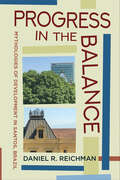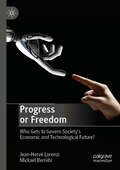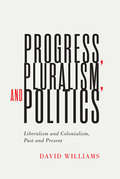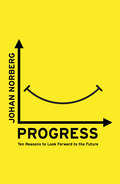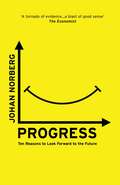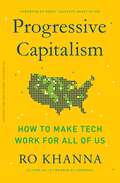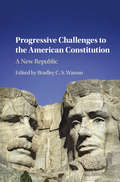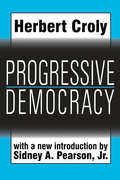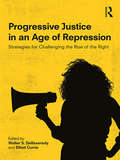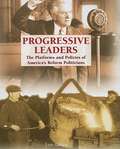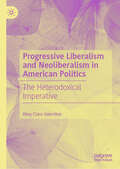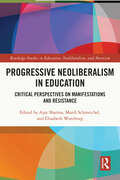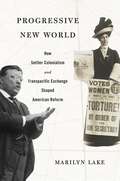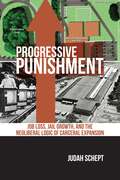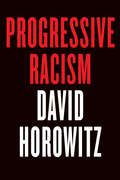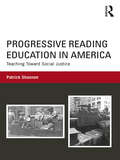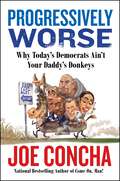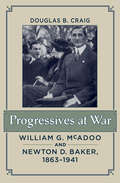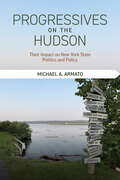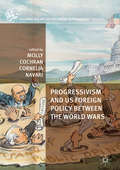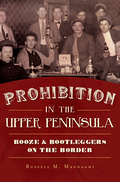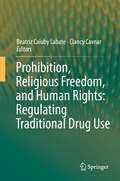- Table View
- List View
Progress in French Tourism Geographies: Inhabiting Touristic Worlds (Geographies of Tourism and Global Change)
by Mathis StockThis book provides an overview of the recent progress in Francophone tourism geography. It focuses on the theoretical advances in social and cultural geography, whereby the symbolic dimensions of tourism and the creation of tourism worlds are key. It puts forward the tourist conceived as mobile, situated, skilled, reflexive inhabitant of places, which gives all its meaning to the expression “inhabiting touristic worlds”. More specifically, this book addresses numerous rarely addressed issues such as the geo-history of tourism, the material cultures of tourists, the digitality and disconnection from digital technologies in National Parcs or the use of knowledge of tourists in metropolises. It gives insights in the specific Francophone approaches such as inhabiting, the urbanity of tourist resorts and the notion of territory in tourist studies. Finally, it provides an overview of the urban dimensions of tourism, place-making in the form of heritage, oasis tourism, sports tourism, production of space in Mexican resorts. As such, the book provides a key read for academics, students and professionals in tourism studies and tourism geography in search for alternative approaches.
Progress in Improving Project Management at the Department of Energy: 2001 Assessment
by Committee for Oversight Assessment of U.S. Department of Energy Project ManagementA report on Progress in Improving Project Management at the Department of Energy
Progress in the Balance: Mythologies of Development in Santos, Brazil
by Daniel R. ReichmanThrough a historical ethnography of Santos, Brazil, Progress in the Balance addresses and assesses an anthropological theory of progress. Observing that anthropology is a progressive discipline with a pessimistic attitude towards progress, Daniel Reichman explains the contested meanings of progress in Brazil and explores how anthropologists and others can define this concept more generally. He investigates how any society can separate "progress" from plain old change and, if change is constantly happening all around us, how and why certain events get lifted out of a normal timeframe and into a mythic narrative of progress.Each chapter outlines a particular episode in the history of Santos, a city undergoing an unprecedented period of economic and political turmoil, as it is represented in public culture, mainly through museums, monuments, art, and public events. Drawing on the anthropology of myth, Reichman proposes a model that he refers to as a "clash of timescapes." Progress in the Balance shows how this concept of "progress" requires a different temporal structure that separates sacralized social change from mundane historical events.
Progress or Freedom: Who Gets to Govern Society’s Economic and Technological Future?
by Jean-Hervé Lorenzi Mickaël BerrebiTechnological dominance is shifting the balance of global economic stability. This is the central premise behind the latest book from Lorenzi and Berrebi who view the rise of artificial intelligence, robotics, use of private data, and genetic transformation, among other developments, culminating in new economic conditions that require a fresh sense of governance in order for society to sustain order. Whilst progress in technology provides numerous opportunities and hope, is the desire to pursue these ambitions in innovation putting our society at risk of being undermined and, ultimately, governed by technology firms? How will these changes affect economic outlooks in an age of growing inequality and aging populations? What role do politicians serve in facilitating these changes? The decline of a labour force, the use of Big Data and increased speeds of communication are but three examples that the authors address in their quest to understand where the limits should lie between progress and disruption for the future of society.
Progress, Pluralism, and Politics: Liberalism and Colonialism, Past and Present (McGill-Queen's Studies in the History of Ideas #79)
by David WilliamsLiberal thinkers of the eighteenth and nineteenth centuries were alert to the political costs and human cruelties involved in European colonialism, but they also thought that European expansion held out progressive possibilities. In Progress, Pluralism, and Politics David Williams examines the colonial and anti-colonial arguments of Adam Smith, Immanuel Kant, Jeremy Bentham, and L.T. Hobhouse.Williams locates their ambivalent attitude towards European conquest and colonial rule in a set of tensions between the impact of colonialism on European states, the possibilities of progress in distant and diverse places, and the relationship between universalism and cultural pluralism. In so doing he reveals some of the central ambiguities that characterize the ways that liberal thought has dealt with the reality of an illiberal world. Of particular importance are appeals to various forms of universal history, attempts to mediate between the claims of identity and the reality of difference, and the different ways of thinking about the achievement of liberal goods in other places.Pointing to key elements in still ongoing debates within liberal states about how they should relate to illiberal places, Progress, Pluralism, and Politics enriches the discussion on political thought and the relationship between liberalism and colonialism.
Progress: Ten Reasons to Look Forward to the Future
by Johan NorbergIt's on the televisions, in the papers and in our minds. Every day we're bludgeoned by news of how bad everything is - financial collapse, unemployment, growing poverty, environmental disasters, disease, hunger, war. But the rarely acknowledged reality is that the economic and social progress of the past few decades has been unprecedented and that by almost any index you care to identify, things are markedly better now than they have ever been for almost everyone alive.Examining official data from the world's most trusted institutions like the United Nations, the World Bank and the World Health Organization, political commentator Johan Norberg traces just how far we have come in tackling the greatest global problems. None of them have been eradicated, but as Norberg shows we now have a good idea of the solutions and have started to implement them in most areas. We know what it will take to see this progress continue. Dramatic, uplifting and sure to be divisive, Progress is a call for optimism in our pessimistic, doom-laden world.
Progress: Ten Reasons to Look Forward to the Future
by Johan NorbergA Book of the Year for The Economist and the Observer Our world seems to be collapsing. The daily news cycle reports the deterioration: divisive politics across the Western world, racism, poverty, war, inequality, hunger. While politicians, journalists and activists from all sides talk about the damage done, Johan Norberg offers an illuminating and heartening analysis of just how far we have come in tackling the greatest problems facing humanity. In the face of fear-mongering, darkness and division, the facts are unequivocal: the golden age is now.
Progressive Capitalism: How to Make Tech Work for All of Us
by Ro KhannaCongressman Ro Khanna offers a revolutionary, &“progressive&” (James J. Heckman, Nobel Prize winner and professor of economics at the University of Chicago) roadmap to facing America&’s digital divide, offering greater economic prosperity to all. In Khanna&’s vision, &“just as people can move to technology, technology can move to people&” (from the foreword by Amartya Sen, Nobel Laureate in Economics) where &“Khanna envisions redistributing opportunities from coastal cities to rural middle-America…An exciting vision, brilliantly rendered.&” (Arlie Russell Hochschild, author of Strangers in Their Own Land).Unequal access to technology and the revenue it creates is one of the most pressing issues in the United States. An economic gulf exists between those who have struck gold in the tech industry and those left behind by the digital revolution; a geographic divide between those in the coastal tech industry and those in the heartland whose jobs have been automated; and existing inequalities in the technological access—students without computers, rural workers with spotty WiFi, and many workers without the luxury to work remotely. Congressman Ro Khanna&’s Progressive Capitalism tackles these challenges head-on and imagines how the digital economy can create opportunities for people across the country without uprooting them. Anchored by an approach Khanna calls &“progressive capitalism,&” he shows how democratizing access to tech can strengthen every sector of economy and culture. By expanding technological jobs nationwide through public and private partnerships, we can close the wealth gap in America and begin to repair the fractured, distrusting relationships that have plagued our country for fall too long. Inspired by his own story born into an immigrant family, Khanna understands how economic opportunity can change the course of a person&’s life. Moving deftly between storytelling, policy, and some of the country&’s greatest thinkers in political philosophy and economics, Khanna presents a vision we can&’t afford to ignore. Progressive Capitalism is a &“practical and aspirational&” (Kimberlé Crenshaw, professor of law at UCLA and Columbia University) roadmap to how we can seek dignity for every American in an era in which technology shapes every aspect of our lives.
Progressive Challenges to the American Constitution: A New Republic
by Watson Bradley C. s.In this volume, Bradley C. S. Watson brings together the leading scholars who have sparked one of the most important intellectual and political movements of our times: the criticism of the progressive intellectual synthesis that has dominated American thought and politics over much of the last century, and has provided the framework in which the administrative state has expanded and flourished. The contributors address the most important questions raised by this movement: what is the meaning of progressivism? What is the nature of the Founders' Constitution and the progressive challenges to it? What is the significance of recent scholarship and public opinion that have arisen in opposition to the progressive vision? What are the implications of American progressivism for twenty-first century politics and policy? Progressive Challenges to the American Constitution addresses the growing doubt about the scope and sustainability of expanded government power.
Progressive Democracy
by Herbert CrolyCroly explains the requirements for a genuinely popular system of representative government providing progressive liberalism with both a philosophical critique of the founding fathers' political outlook, and a political strategy for replacing it with something more in keeping with a new epoch. Although it was written in 1914, the intellectual structure remains largely intact within the liberal-progressive tradition.
Progressive Justice in an Age of Repression: Strategies for Challenging the Rise of the Right
by Elliott Currie Walter S. DeKeseredyProgressive Justice in an Age of Repression provides a much-needed engagement with questions of justice and reform within the current phase of global capitalism, one that is marked not only by significant social inequality, but also political bifurcation. It offers guidance on progressive strategies for resistance. It also extends criminological analysis by situating these contemporary challenges as globalized and inextricably linked to questions of political economy, law, and society. Bringing together an international selection of scholars, this book draws on a range of issues, such as immigration, street crime and the renewed push for "law and order," violence against women, environmental injustice, assaults on health care and social services, and the unleashing of private corporate exploitation of natural resources. It is a clarion for strategic thinking, a call for action fuelled by informed analysis, and a reimagining of the progressive society that is under attack by Trumpism, populism, and a rising right. This is an important read for those who teach and study criminology, deviance and social control, social problems, legal studies, political science, and policy studies. It is also a useful resource for practitioners, community-based activists, and policy makers seeking new ways of thinking critically about crime, law, and social control.
Progressive Leaders: The Platforms And Policies Of America's Reform Politicians
by Lois SakanyStudents will gain an understanding and appreciation of the most important people who defined the Progressive Era: the Great Commoner William Jennings Bryan, Senator Robert La Follete and his liberal politics, Theodore Roosevelt and his Square Deal Policy, and Woodrow Wilson and the establishment of the Federal Trade Commission. This title will reinforce one view that the progressive accomplishments left a positive impact on society, while the other view is that they gave too much power and responsibility to government.
Progressive Liberalism and Neoliberalism in American Politics: The Heterodoxical Imperative
by Riley Clare ValentineThis book examines twentieth and twenty-first-century American political discourse through the framework of progressive liberalism and neoliberalism. Progressive liberalism and neoliberalism as forms of normative reason redefine specific political concepts, which are central to American liberalism—equality, liberty, the role of the state, and the pursuit of happiness. Language is how political reason and the norms accompanying it are expressed. The text moves through Presidents Franklin Delano Roosevelt to Barack Obama, exploring shifts in language and interpretations of political concepts through progressive liberal and neoliberal forms of normative reason. A tension emerges between progressive liberalism and neoliberalism, and a heterodoxy emerges. The heterodoxy we find ourselves in continues the problem that is foundational to American liberalism itself—liberalism is inherently a theory and discourse of rights, not of need. Because of this, no form of liberalism can appropriately respond to human needs from a standpoint that is not informed by having a right to or a right from.
Progressive Neoliberalism in Education: Critical Perspectives on Manifestations and Resistance (Routledge Studies in Education, Neoliberalism, and Marxism)
by Ajay SharmaThis volume makes the novel contribution of applying Nancy Fraser’s concept of progressive neoliberalism to education in order to illustrate how social justice efforts have been co-opted by neoliberal forces. As well as recognising the lack of consensus surrounding the very nature of Fraser’s concept of progressive neoliberalism, the book delivers a diversity of perspectives and methodological orientations that offer critical and nuanced examination of the diverse ways in which progressive neoliberalism has shaped education in North America. Documenting manifestations of progressive neoliberalism in areas including anti-racist education, teacher education, STEM, and assessment, the volume uses qualitative empirical research and critical discourse analysis to identify emerging tools and strategies to disentangle the progressive aims of education from neoliberal agendas. Offering a rarely nuanced treatment of the phenomenon of neoliberalism, this text will benefit scholars, academics, and students in the fields of education policy and politics, the sociology of education, and the philosophy of education more broadly. Those involved with the theory of education and multicultural education in general will also benefit from this volume.
Progressive New World: How Settler Colonialism and Transpacific Exchange Shaped American Reform
by Marilyn LakeIn a bold argument, Marilyn Lake shows that race and reform were mutually supportive as Progressivism became the political logic of settler colonialism at the turn of the 20th century. She points to exchanges between American and Australasian reformers who shared racial sensibilities, along with a commitment to forging an ideal social order.
Progressive Punishment: Job Loss, Jail Growth, and the Neoliberal Logic of Carceral Expansion (Alternative Criminology #1)
by Judah ScheptWinner, 2017 American Society of Criminology's Division on Critical Criminology and Social Justice Best Book AwardAn examination of the neoliberal politics of incarceration The growth of mass incarceration in the United States eludes neat categorization as a product of the political Right. Liberals played important roles in both laying the foundation for and then participating in the conservative tough on crime movement that is largely credited with the rise of the prison state. But what of those politicians and activists on the Left who reject punitive politics in favor of rehabilitation and a stronger welfare state? Can progressive policies such as these, with their benevolent intentions, nevertheless contribute to the expansion of mass incarceration?In Progressive Punishment, Judah Schept offers an ethnographic examination into the politics of incarceration in Bloomington, Indiana in order to consider the ways that liberal discourses about therapeutic justice and rehabilitation can uphold the logics, practices and institutions that comprise the carceral state. Schept examines how political leaders on the Left, despite being critical of mass incarceration, advocated for a “justice campus” that would have dramatically expanded the local criminal justice system. At the root of this proposal, Schept argues, is a confluence of neoliberal-style changes in the community that naturalized prison expansion as political common sense among leaders negotiating crises of deindustrialization, urban decline, and the devolution of social welfare. In spite of the momentum that the proposal gained, Schept uncovers resistance among community organizers, who developed important strategies and discourses to challenge the justice campus, disrupt some of the logics that provided it legitimacy, and offer new possibilities for a non-carceral community. A well-researched and well-narrated study, Progressive Punishment offers a novel perspective on the relationship between liberal politics, neoliberalism, and mass incarceration.
Progressive Racism
by David HorowitzProgressive Racism is about the transformation of the civil rights movement from a cause opposing racism-the denigration of individuals on the basis of their skin color - into a movement endorsing race preferences and privileges for select groups based on their skin color. It describes the tragic changes of this cause under the leadership of racial extortionists like Al Sharpton, who took a movement in support of American pluralism and turned it into a movement governed by a lynch mob mentality in which white Americans are regarded as guilty before the fact and African Americans are regarded as innocent even when the facts prove them guilty, even when their crimes are committed against other African Americans.The author of Progressive Racism, David Horowitz, is a witness to these events and betrayals. Horowitz was a participant in the civil rights movement of the 1960s, and in 2001 led a national campaign against a proposal for "slavery reparations" that would have required Hispanic, Asian and other Americans who had no role in slavery to pay reparations to African Americans who were never slaves. Progressive Racism examines how the term "racism" has been drained of its original meaning and is now used as a weapon to bludgeon opponents into silence. It describes how the so-called civil rights movement has become an oppressor of African Americans by supporting a failed school system that blights the lives of millions of African American children and a welfare system that has destroyed the black family and created a "underclass" dependent on government charity. It is an indictment of the hypocrisy that today governs discourse on race issues, so that a lynch mob in Ferguson, Missouri seeking to hang a police officer because he was white can be described as a civil rights protest and be supported by the first African American president of the United States.
Progressive Reading Education in America: Teaching Toward Social Justice
by Patrick ShannonThrough firsthand accounts of classroom practices, this new book ties 130 years of progressive education to social justice work. Based on their commitments to the principle of the equal moral worth of all people, progressive teachers have challenged the obstacles of schooling that prevent some people from participating as full partners in social life in and out of the classroom and have constructed classroom and social arrangements that enable all to participate as peers in the decisions that influence their lives. Progressive reading education has been and remains key to these ties, commitments, challenges, and constructions. The three goals in this book are to show that there are viable and worthy alternatives to the current version of "doing school"; to provide evidence of how progressive teachers have accommodated expanding notions of social justice across time, taking up issues of economic distribution of resources during the first half of the 20th century, adding the cultural recognition of the civil rights of more groups during the second half, and now, grappling with political representation of groups and individuals as national boundaries become porous; and to build coalitions around social justice work among advocates of differing, but complementary, theories and practices of literacy work. In progressive classrooms from Harlem to Los Angeles and Milwaukee to Fairhope, Alabama, students have used reading in order to make sense of and sense in changing times, working across economic, cultural, and political dimensions of social justice. Over 100 teacher stories invite readers to join the struggle to continue the pursuit of a just democracy in America.
Progressive and Conservative Religious Ideologies: The Tumultuous Decade of the 1960s
by Richard LintsThis book explores the surprisingly disruptive role of religion for progressive and conservative ideologies in the tumultuous decade of the 1960s. Conservative movements were far more progressive than the standard religious narrative of the decade alleges and the notoriously progressive ethos of the era was far more conservative than our collective memory has recognized. Lints explores how the themes of protest and retrieval intersect each other in ironic ways in the significant concrete controversies of the 1960s - the Civil Rights Movement, Second Feminist Movement, The Jesus Movements, and the Anti-War Movements - and in the conceptual conflicts of ideas during the era - The Death of God Movement, the end of ideology controversy, and the death of foundationalism. Lints argues that religion and religious ideologies serve both a prophetic function as well as a domesticating one, and that neither "conservative" nor "progressive" movements have cornered the market in either direction. In the process Lints helps us better understand the complex role of religion in cultural formation.
Progressively Worse: Why Today's Democrats Ain't Your Daddy's Donkeys
by Joe ConchaIf John F. Kennedy, Tip O’Neill, or even Bill Clinton were to run as Democrat candidates today, their own party would cancel them in a heartbeat.If the Joe Biden of 1992 were to run today, MSNBC would label him “MAGA Joe.” How did JFK’s party of Catholics and union workers become AOC’s party of privileged Ivy Leaguers with “Queers for Palestine” signs and purple hair?Over the past few decades, Democrats have swung so far to the left that they have little in common with past generations of progressives. In Progressively Worse, bestselling author and Fox News contributor Joe Concha highlights how the Democrats used to:· Care about blue collar workers· Protest against new wars· Defend free speech· Criticize the elites and Wall Street· Want limits on immigrationNow, the party of the hippies is now the party of Hamasniks, and the party of feminists now celebrates male athletes in women’s sports. Though spotlights of key influencers like Gavin Newsom, Rashida Tlaib, Keith Olbermann, and Pete Buttigieg, Progressively Worse lays out the facts every American should know about the Democrat party. It’s not even a party anymore. It’s more like the hangover the day after.
Progressives at War: William G. McAdoo and Newton D. Baker, 1863–1941
by Douglas B. CraigCraig's study of McAdoo and Baker illuminates the aspirations and struggles of two prominent southern Democrats.In this dual biography, Douglas B. Craig examines the careers of two prominent American public figures, Newton Diehl Baker and William Gibbs McAdoo, whose lives spanned the era between the Civil War and World War II.Both Baker and McAdoo migrated from the South to northern industrial cities and took up professions that had nothing to do with staple-crop agriculture. Both eventually became cabinet officers in the presidential administration of another southerner with personal memories of defeat and Reconstruction: Woodrow Wilson. A Georgian who practiced law and led railroad tunnel construction efforts in New York City, McAdoo served as treasury secretary at a time when Congress passed an income tax, established the Federal Reserve System, and funded the American and Allied war efforts in World War I. Born in the eastern panhandle of West Virginia, Baker won election as mayor of Cleveland in the early twentieth century and then, as Wilson's secretary of war, supervised the dramatic build-up of the U.S. military when the country entered the Great War in Europe.This is the first full biography of McAdoo and the first since 1961 of Baker. Craig points out similarities and differences in their backgrounds, political activities, professional careers, and family lives.Craig's approach in Progressives at War illuminates the shared struggles, lofty ambitions, and sometimes conflicted interactions of these figures. Their experiences and perspectives on public and private affairs (as insiders who nonetheless were, in some sense, outsiders) make their lives, work, and thought especially interesting. Baker and McAdoo, in league with Wilson, offer Craig the opportunity to deliver a fresh and insightful study of the period, its major issues, and some of its leading figures.
Progressives on the Hudson: Their Impact on New York State Politics and Policy (Excelsior Editions)
by Michael A. ArmatoChronicles the civic endeavors of progressive political activists in New York's Hudson Valley.Drawing on riveting firsthand accounts, Progressives on the Hudson highlights the influence of progressives in campaigns and elections, political parties, nongovernmental organizations, and the policy arena. Michael A. Armato explores these activities in the context of structural factors unique to the state of New York. Beyond simply serving as a study of one of New York's most historic regions, Armato shows that progressive civic engagement is not confined to America's largest cities. And, even more broadly, he provides readers with an in-depth discussion of progressive political ideology and illustrates that while progressives share some common ideas, they are by no means a monolith. Offering readers a rich description of civic life in the Hudson Valley, as told by progressive activists, and supplemented by local news sources and primary documents, Progressives on the Hudson skillfully contributes to our understanding of civic engagement and political ideology.
Progressivism and US Foreign Policy between the World Wars (The Palgrave Macmillan History of International Thought)
by Molly Cochran Cornelia NavariThis book considers eleven key thinkers on American foreign policy during the inter-war period. All put forward systematic proposals for the direction, aims and instruments of American foreign policy; all were listened to, in varying degrees, by the policy makers of the day; all were influential in policy terms, as well as setting the terms of contemporary debate. The focus of the volume is the progressive agenda as it was formulated by Herbert Croly and The New Republic in the run-up to the First World War. An interest in the inter-war period has been sparked by America’s part in international politics since 9/11. The neo-conservative ideology behind recent US foreign policy, its democratic idealism backed with force, is likened to a new-Wilsonianism. However, the progressives were more wary of the use of force than contemporary neo-conservatives. The unique focus of this volume and its contextual, Skinnerian approach provides a more nuanced understanding of US foreign policy debates of the long Progressive era than we presently have and provides an important intellectual background to current debates.
Prohibition in the Upper Peninsula: Booze & Bootleggers on the Border (American Palate)
by Russell M. MagnaghiTemperance workers had their work cut out for them in the Upper Peninsula. It was a wild and woolly place where moonshiners, bootleggers and rumrunners thrived. Al Capone and the Purple Gang came north to keep Canadian whiskey passing through Sault Ste. Marie to Chicago and Detroit. Federal enforcement agent John Fillion double-crossed both his office and the bootleggers. The Grand Hotel on Mackinac Island survived due to gambling and fine Canadian whiskey brought in by rumrunners, sometimes assisted by the Coast Guard. Author Russell M. Magnaghi dives into the raucous history of Yooper Prohibition.
Prohibition, Religious Freedom, and Human Rights: Regulating Traditional Drug Use
by Beatriz Caiuby Labate Clancy CavnarThis book addresses the use and regulation of traditional drugs such as peyote, ayahuasca, coca leaf, cannabis, khat and Salvia divinorum. The uses of these substances can often be found at the intersection of diverse areas of life, including politics, medicine, shamanism, religion, aesthetics, knowledge transmission, socialization, and celebration. The collection analyzes how some of these psychoactive plants have been progressively incorporated and regulated in developed Western societies by both national legislation and by the United Nations Drug Conventions. It focuses mainly, but not only, on the debates in court cases around the world involving the claim of religious use and the legal definitions of "religion. " It further touches upon issues of human rights and cognitive liberty as they relate to the consumption of drugs. While this collection emphasizes certain uses of psychoactive substances in different cultures and historical periods, it is also useful for thinking about the consumption of drugs in general in contemporary societies. The cultural and informal controls discussed here represent alternatives to the current merely prohibitionist policies, which are linked to the spread of illicit and violent markets. By addressing the disputes involved in the regulation of traditional drug use, this volume reflects on notions such as origin, place, authenticity, and tradition, thereby relating drug policy to broader social science debates.


